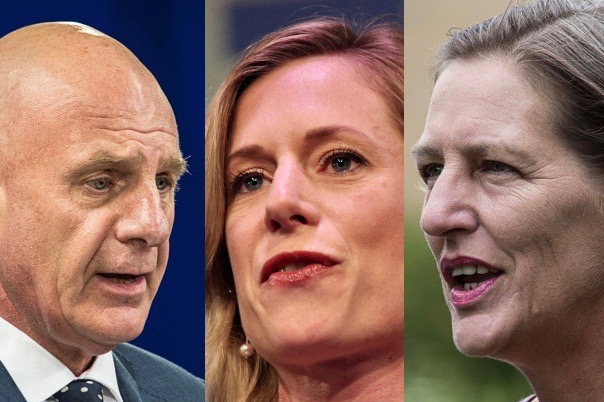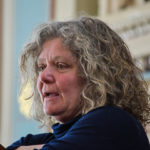Inside story: how COVID-19 shut down Tasmania’s parliament - and whether it should have

About 9am on 26 March, Tasmanian government minister Michael Ferguson called Greens leader Cassy O’Connor to tell her that, within hours, state parliament would be suspended.
There was “no safe way for us to meet”, Ferguson said, according to notes O’Connor took during the call. In order to protect the parliament’s brigade of clerks, cleaners and other workers from the COVID-19 pandemic, the government would table a motion to halt sittings until 18 August. Just over an hour later, both the Labor and Greens opposition leaders were in the chamber reluctantly agreeing.
Later that day in the upper house, legislative councillors were finishing an exhausting session poring over laws granting premier Peter Gutwein and his ministers sweeping powers to deal with the health crisis. As the meeting closed, the government moved that the council meet again in five months, not in April as scheduled. All 15 councillors mutely waved it through.
Some were unaware that the same had happened a few hours earlier in the House of Assembly. “There was no time to think about it,” says Ruth Forrest, an independent and deputy president of the chamber. “It was just done.”
The move upended the governance of Tasmania and its half a million citizens. Gutwein had already begun what has been a widely-praised response to the looming public health threat, including effectively closing the borders and expanding his executive functions, and was preparing to roll out the most restrictive impositions on civil liberties since the island was a British penal colony. Now the oversight of the people’s elected representatives had been stripped with their unanimous assent.
Tasmania’s parliament sat through the influenza epidemic of 1919-20. It kept working through both world wars, keeping check on governments with wartime powers.

Former Tasmanian Labor Premier, David Bartlett. Image: Bob Burton
David Bartlett, a Labor premier between 2008 and 2011, is among those who say it is disturbing that the Westminster system of scrutiny by parliament has now been laid aside.
In the lower house, the government had the majority it needed to suspend sittings. But in the upper chamber the Liberals hold just two seats, Labor four and there are nine independents. Bartlett says the manner in which non-government members ushered themselves out of authority was an “abrogation of their duty”.
“This is their job: to scrutinise the government, and the opposition cannot scrutinise effectively without the parliament,” he says. “It turns out that when we really, really need that scrutiny because civil liberties are being impinged upon — I think for very good reasons, don’t get me wrong… they all voted to bloody pack up and go home.”
Meg Webb, an independent MLC in her first year, says it “it did not even occur to me in that moment to stand up and make a fuss”. She now believes it was “a massive ball drop”. “The most massive ball drop, from me and all of us up there. It was only afterwards I thought ‘holy shit, what did we just do’?”
How off-the-record chats were substituted for parliament meeting
An examination of public and private conversations held during that pivotal week and since shows parliamentarians agreed to suspend their oversight role without first securing alternative arrangements. Instead, in the rush and turmoil of the pandemic, Tasmania’s political class traded institutional checks on government for personal assurances from the premier.
The conditions during the last week of parliament were exceptional. Coronavirus cases were landing in the state as Tasmanians fled home from interstate, cruise ships and overseas. There was fear at the threat COVID-19 posed inside the parliament, particularly to older staff and politicians.
On the floor of both houses, there was an unusual atmosphere of haste, decency and shared purpose. When the Greens and Labor raised concerns about the expansion of his powers, Gutwein gave his word that he would act in good faith and it was accepted.
In private, the premier was working to rehabilitate the personal relationships he would rely on in the coming weeks as government accountability was made less formal. He was holding regular talks with Labor leader Rebecca White, and promised to give White and O’Connor a weekly briefing on the crisis. The Greens leader says she and Gutwein used to be “smoking buddies” outside Parliament House and now “really didn’t get on”, but in recent weeks she has been surprised on more than one occasion by an impromptu call from the premier.
Forrest says Gutwein has also kept in touch with her. Both Forrest and O’Connor report the government has been much more responsive than normal to their queries on behalf of constituents. “He’s a real communicator,” O’Connor says. “I have been reassured by his tone, his apparent humility and his desire to be open about the decisions that are being made.”
“They’re a government, they are not a secret club.” – Leanne Minshull, The Australia Institute
As agreed, the communication has included a 30-45 minute call between Gutwein, White and O’Connor at 7.30am each Friday and on Easter Thursday. The calls have run to an agenda roughly like this: an update from Gutwein on the measures the government is taking, then Gutwein asking White and O’Connor about their concerns and what they have been hearing from constituents. “He’s interested to know how people are feeling,” O’Connor says.

Leanne Minshull, Director of the Australia Institute Tasmania. Image: Bob Burton
These chats are currently the opposition’s major mechanism for questioning the actions of the government. Bartlett says it isn’t enough. “I don’t know what Cassy O’Connor and Bec White are saying [on the phone calls with Gutwein]. I don’t know whether they are simply complicit in whatever the government wants to do.”
Leanne Minshull, the director of The Australia Institute’s Tasmanian branch and a former chief-of-staff to O’Connor, agrees. “It’s very paternalistic, from [Gutwein], but from Bec and Cassy as well,” she says.
“They’re a government. They are not a secret club that the people of Tasmania have to just trust that they are doing the right thing for us. Where is the accountability for us? Why can’t we see who is talking? And if we want to have a voice into the decision making - as we should because it’s good for the people of Tasmania, but it’s also good for the decision makers - where’s our avenue to do that? It’s bullshit.”
After the government has bolted, accountability proposals emerge
Writing in The Guardian last week, Australian human rights commissioner Edward Santow said emergency restrictions must have “genuine independent oversight”. That condition is not currently being met in Tasmania.
As an alternative to a full parliament, the Subordinate Legislation Committee, which includes cross-party members of upper and lower houses, has had its remit expanded to review and even reject some government decisions. But its work will happen days or weeks after new rules have been put into effect. Despite the government having already introduced new rules upending Tasmanian life, the next committee meeting is not for two weeks.
Forrest, who sits on the committee, says: “As far as the other decisions of government [go], at this stage there isn’t any oversight. We’ve just got to take it on trust. I think that will need to change.”
Blind spots include the spending of $150 million appropriated by the Treasury to fund the response to the crisis, and the orders of director of public health Mark Veitch, who has almost unlimited power to impose restrictions to fight the spread of disease.
Like the government’s early containment of the virus, Veitch has been praised. But in the past week an outbreak centred on a hospital has gathered pace, and the lack of oversight became a topic during the premier’s daily press conferences. Asked about a parliamentary inquiry to discover what had occurred at the Northwest Regional Hospital, Gutwein said he would welcome that scrutiny at a later date, but didn’t want to remove health officials from the front line to give evidence to parliament.
In the past two weeks there has been a collective realisation among non-government politicians that too much ground has been ceded. On the same day parliament rose, White wrote to Gutwein asking him to implement “caretaker” arrangements that would allow the opposition to give feedback on government decisions before they were made.
The Labor leader had previously been in talks with the government about adjourning until it was safe to meet again, but the party’s spokespeople would not say if she was told in advance that the adjournment would continue until August. White did not ask about caretaker arrangements on the floor of parliament, nor make them a condition of backing the adjournment. Instead, the opposition waited two weeks before going public with her request.
White’s chief-of-staff Michael Stedman says: “We believed it appropriate and courteous to allow the premier time to respond to the letter before going to the media.”
O’Connor, for her part, is clearly troubled. She now believes the way the adjournment was presented was an attempt to wrongfoot some parliamentarians. She says she regrets not being “more nimble” and putting forward suggestions for alternative arrangements while the house was in session. She has now suggested the state follow New Zealand’s example by setting up a parliamentary committee with an opposition majority to scrutinise the government’s response to the crisis. The Australia Institute and Webb have also called for this solution.
Gutwein and White have offered tentative backing for another suggestion: parliamentary meetings via teleconference. A partial return of a remote parliament is now being implemented in the UK, where leaders from all major opposition parties have requested parliament be recalled, but advice requested by the Greens from Shane Donnelly, the House of Assembly clerk, is that this proposal raises procedural and technological challenges that would need to be looked into, whereas a NZ-style committee could be relatively easily established.
Bartlett, on the other hand, believes the idea of a “unity cabinet” is at odds with the fundamental role of a Westminster parliament, which requires an opposition to publicly question ministers of government. He says an in-person parliament is necessary for that to work, and wants the lower house to hold a weekly question time run by a skeleton staff.
“It’s effectively law by press release.” – Greg Barns, barrister
Both Labor and the Greens say Gutwein has told them in the past week that some measures to expand transparency will be announced “shortly”. The premier’s office declined an interview and did not respond to questions regarding the events described here.
Gutwein has always maintained parliament could be returned if needed. Indeed, last Wednesday, the premier said it would be recalled “in the coming weeks” for a one-off sitting to pass laws relating to the conduct of landlords and extend the terms of two MLCs who have had elections deferred.
Concern over erosion of democratic norms
Parliamentary scrutiny is not only a check against abuse; it forces governments to work more thoroughly. Bartlett is a case in point - he says his experience of governing in minority with the Greens led him to a new level of detail in policymaking.

Greg Barns. Image: Bob Burton
In recent weeks, new social distancing rules have been issued, then continually clarified in the premier’s daily press conferences. Forrest says her office had been inundated with genuine questions about how her constituents can lawfully behave. With police being given wide discretion to interpret stay at home orders, using helicopters to surveil movement and issuing large fines, Hobart barrister Greg Barns says it is important a minister be available to the parliament to clear up confusion.
“If there are these sorts of draconian penalties that are available, it’s unfair to penalise people in an atmosphere where it is far from certain what the law is and how that law is communicated,” he says. “I mean, it’s effectively law by press release.”
Critics of the parliamentary shutdown point out these are not benign times for experimental civics. Just a few months ago, the Tasmanian government tabled laws exposing protesters to long jail terms that Amnesty International called “harsh and unnecessary”. The human rights group warned against a nationwide erosion of “the vital foundations of Australia’s democracy”.
In other parts of the world, authoritarian leaders have used the coronavirus to change, perhaps permanently, the relationship between the executive and the people. Hungary’s Victor Orbán has expanded his powers to the point of autocracy.
“It worries me that this is being done against the backdrop of an increase in fascism,” says Sophie Rigney, who recently returned to the state after teaching law at the University of Dundee and spoke to Tasmanian Inquirer from home quarantine.
O’Connor agrees placing the level of scrutiny at the discretion of the premier is “a risk” but says as she wrestled with how to respond to the suspension of parliament she had reflected on the importance of shared island experience, what she calls “a Tasmanian-ness”.
“If Peter Gutwein looks Rebecca White and I in the eye and says ‘I will not abuse your trust’, and we are all on this little island together, that means something. Of course it’s not scrutiny and accountability. It’s not everything. But it has some meaning down here,” the Greens leader says.
It highlights that, during one of the most urgent, frightening crises in the island’s modern history, Tasmanian politicians collectively and reflexively reached for interpersonal politics rather than formal public institutions.

Meg Webb, Legislative Council member for Nelson. Image: Bob Burton
Some, including O’Connor, now clearly regret it and the government appears ready to patch it up to some degree. But Webb, who worked in social policy before becoming an MLC, says the manner in which parliament has been dispensed with raises questions that will linger beyond the current health emergency.
“Does it tell us that governments in Tasmania are used to being able to just do things without having to explain themselves, without having to be directly accountable to the people in a substantial way, that they are used to being able to make decisions behind doors amongst people of influence?” she says.
“Does it tell us that parliament and the representatives in parliament are used to that being the norm too, to some extent? Is there a complacency there?
“I wonder.”
If you have information or tips regarding Tasmania’s fight against the coronavirus please email kjmathiesen@gmail.com or WhatsApp/Signal: +44 7869704645. We’d particularly like to hear from staff or health officials working with the North West Regional, North West Private or Launceston General hospitals. As well as anyone who can help explain Tasmania’s current virus testing regime. All contacts can be considered secure. Or you can send a message via the link below.
 @KarlMathiesen
@KarlMathiesen